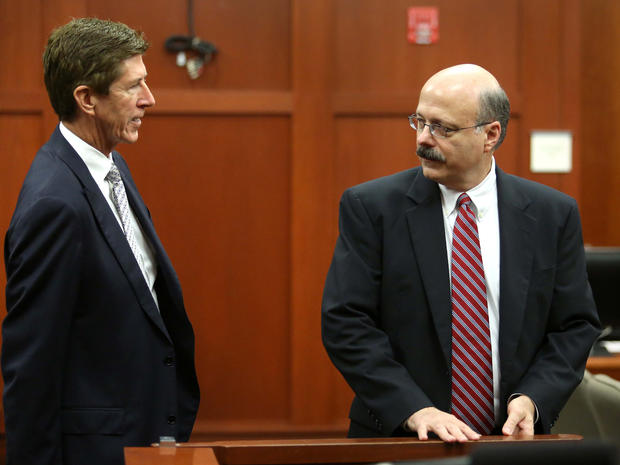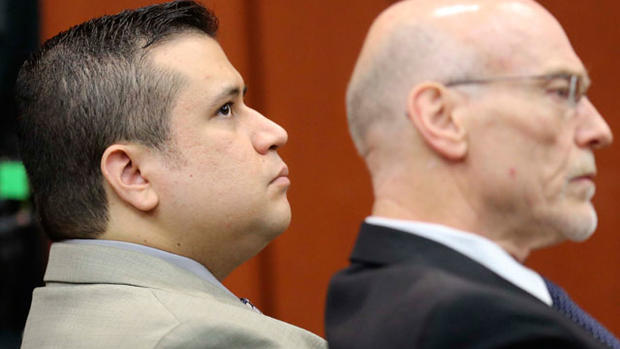George Zimmerman Trial: Opening statements could come Monday, attorneys say
(CBS/AP) SANFORD, Fla. - Prosecutors and defense attorneys indicated Wednesday that opening statements in the George Zimmerman trial could take place as early as next Monday. But before that, they will need to settle upon six jurors and four alternates.
PICTURES: George Zimmerman in court
READ: Trayvon Martin Shooting: A timeline of events
Attorneys in the trial of the former neighborhood watch captain accused in the shooting death of unarmed Florida teen Trayvon Martin have been closely questioning a pool of 40 potential jurors since Wednesday morning, asking them their views on guns, whether they had been victims of crime, whether they made judgments based on how people dressed or had been neighborhood watch volunteers themselves. The group was whittled down from a pool of hundreds of prospective jurors that were questioned for more than a week about their media exposure to media reports about the high-profile case.
Once seated, the jury will be tasked with weighing whether Zimmerman committed second-degree murder when he shot Martin during a confrontation in a Sanford, Fla. gated community last year. Zimmerman, 29, claims he acted in self-defense.
Thursday, Zimmerman defense attorney Mark O'Mara asked the group whether anyone took issue with the right to bear arms. Zimmerman, who had a concealed carry permit, was armed the night of the deadly confrontation.
"I have an issue with what kinds of weapons you're allowed to bear," one potential juror said.
O'Mara questioned the jurors about concealed carry permits, asking their thoughts on training for people who are issued the permits.
"I think that's appropriate," another potential juror said.
One potential juror trial belongs to the National Rifle Association. Another says she was the victim of a violent crime that is constantly on her mind. A third is a competitive arm-wrestler.
Martin's shooting death on Feb. 26, 2012 - and the initial decision not to charge him - led to public outrage and demonstrations around the nation, with some accusing Sanford police of failing to investigate the shooting thoroughly from the start because of Martin's race and because he was from the Miami area.
Martin was black and wearing a hoodie at the time of the confrontation; the hoodie later was appropriated by protesters as a symbol of the shooting. Zimmerman identifies himself as Hispanic.
Prosecutor Bernie de la Rionda began the second round of more intensive, personal questioning Wednesday with the 40 potential jurors, whose names are kept confidential. The final jury will be sequestered throughout the trial to protect jurors from outside influence.
Several jury candidates were involved with rescuing animals, and the pool included individuals who compete in arm-wrestling, fishing and barbecue competitions. Seven potential jurors said they had previously been arrested. But they said that their cases had been dropped and that they thought they'd been treated fairly.
Fourteen candidates said they had been victims of crimes, including four who'd been victims of violent crimes. A white woman in her 50s said it would be difficult for her to keep her experience with a violent crime out of the courtroom.
"It's always in my mind," she said.
Twenty-seven of the 40 potential jurors are white, seven are black, three are mixed race and three are Hispanic. Twenty-four are women and 16 are men.
The racial and ethnic makeup of potential jurors is relevant because prosecutors have alleged that Zimmerman, while a neighborhood watch volunteer for his community, Fla., profiled Martin in following the teen as Martin was walking back from a convenience store to the home of his father's fiancee.
De la Rionda also asked if the potential jurors had been members of a neighborhood watch group and if it was acceptable for individuals to take the law into their own hands. None of the jurors had much experience with neighborhood watch groups and for the most part didn't believe it was OK for individuals to act as law enforcement officers.
The prosecutor also asked if potential jurors either owned or had fired guns and if the race or age of Martin was important to any decision they would make. About two dozen jury candidates either owned or had fired guns, and a white man in his 60s said he was a member of the NRA. No one said age and race mattered.
When asking potential jurors about whether clothing mattered, a reference to Martin's hoodie, a white woman in her 30s said, "I try not to make judgments, but I know we make assumptions."
Complete coverage of the George Zimmerman-Trayvon Martin case on Crimesider

